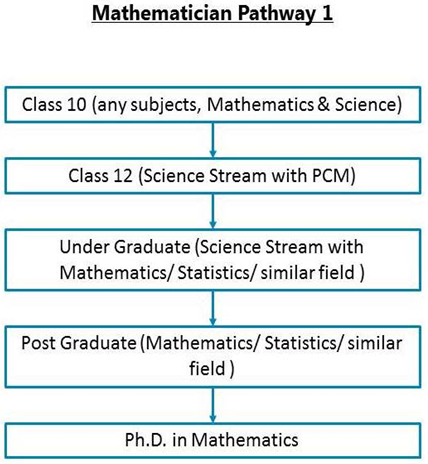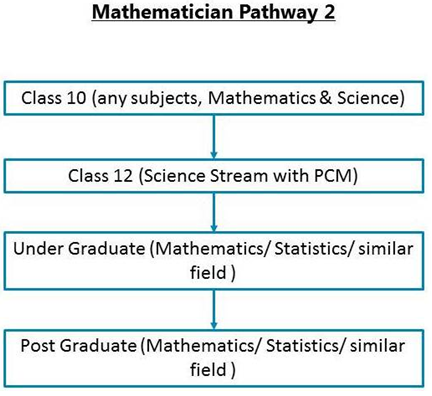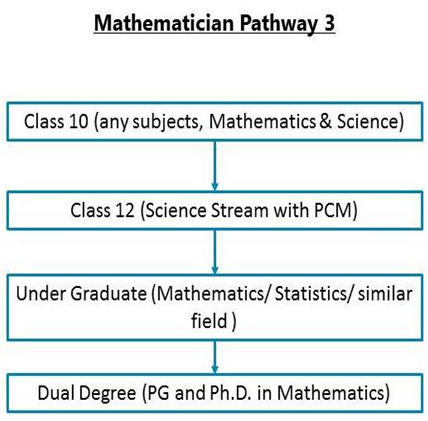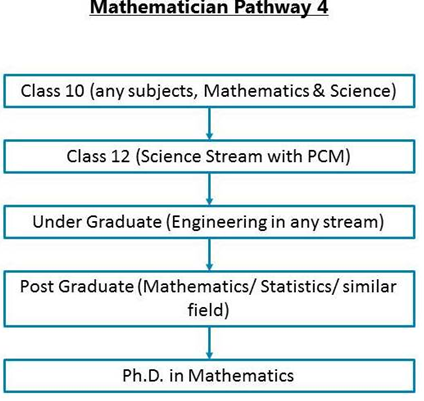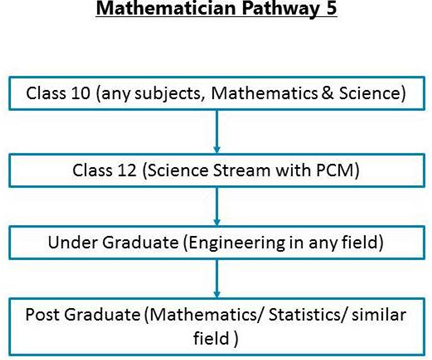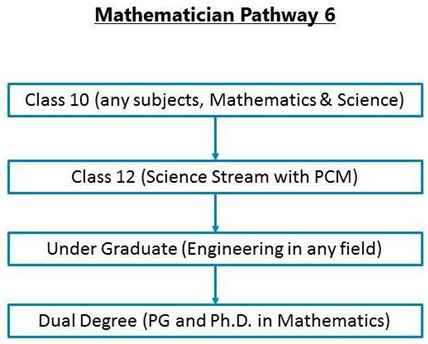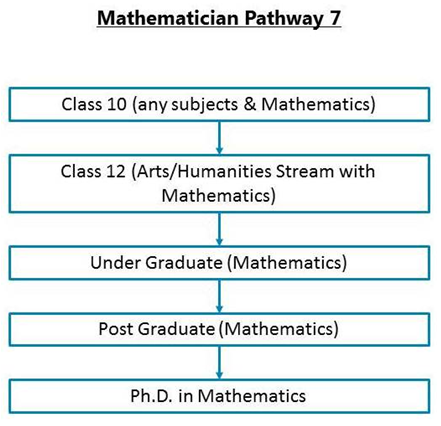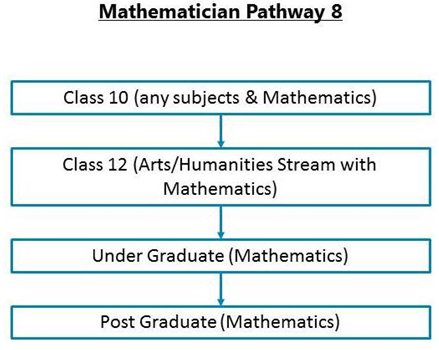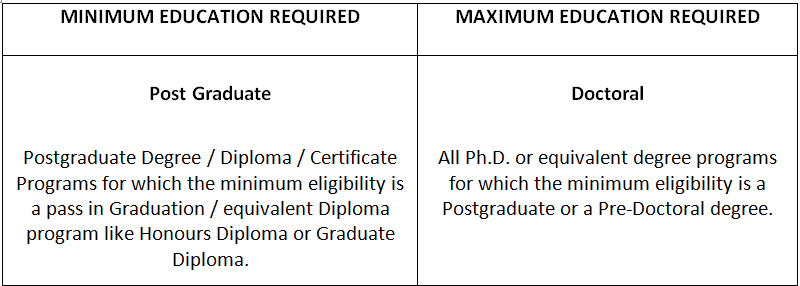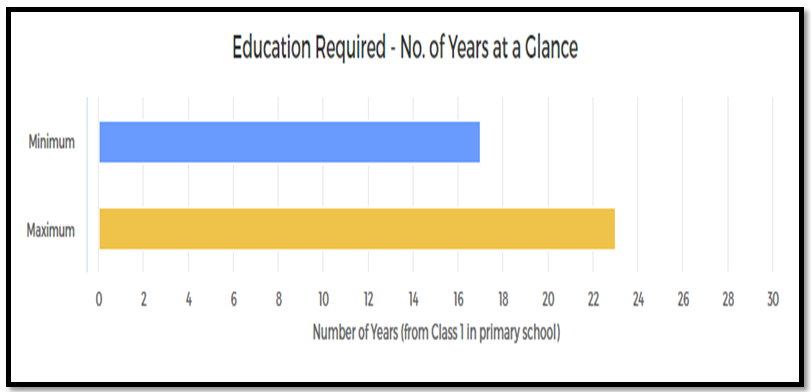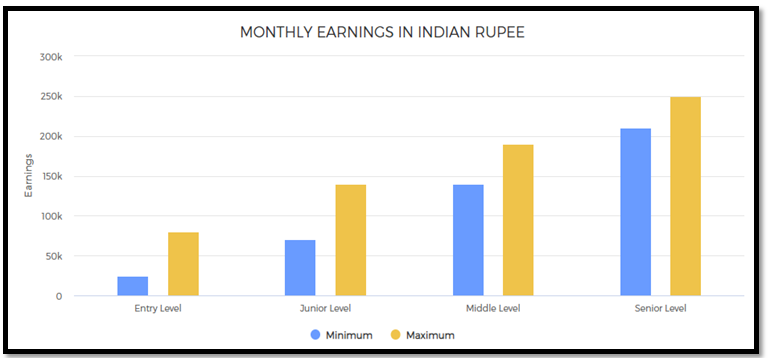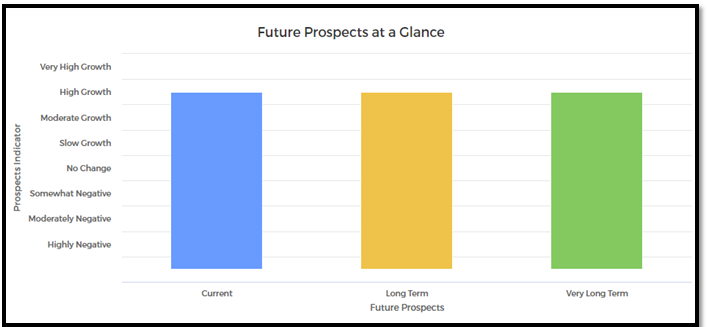Mathematician
Entry Level Qualification
Graduate
Career Fields
Mathematics & Science
For Specially Abled







 ,
,
Career Entrance Exam
About Career
A Mathematician is a specialist scientist who uses the knowledge of mathematics and/or statistics to solve mathematical problems in different fields. Mathematician generally uses numbers, data, quantity, space, mathematical models, etc. for their problem-solving. Generally, Mathematicians can be classified into two broad fields:
Applied Mathematician: An applied mathematician is a specialist who solves problems which have applications in real life. As an applied mathematician, you will approach many of the real-life scientific and industrial problems. You will work on mathematical models for science, technology, engineering, economics, etc.
Pure Mathematician: Pure mathematician is a specialised scientist who studies abstract concepts in mathematics. They try to establish theories in different fields through mathematical tools.
Key roles and responsibilities
As a mathematician, depending on your field of specialisation, you would have the following roles and responsibilities:
1. As a mathematician, you will develop computational methods to solve problems that may occur in the world of science and engineering or in the field of business or industry.
2. You will apply mathematical theories and technique to solved problems related to business, engineering, science, economics, etc.
3. You will share your research in the field with professional journals so that other mathematicians or scientist can use them.
4. You will develop new mathematical rules, theories, the concept’s in different areas.
5. You will work with another scientist from biology, physics, chemistry, etc. and help them with statistical tools, solutions, etc.
6. You will design surveys, experiments, opinion polls to collect data.
7. You will develop mathematical or statistical models to analyse data. You will also work to interpret the data and report conclusions from these analyses.
8. You will use data analysis to improve industrial or business decisions.
PARTICULARS | DESCRIPTION |
Name | Mathematician |
Purpose | Develop New Mathematical Principles |
Career Field | Mathematics & Science |
Required Entrance Exam | No Entrance Exam |
Average Salary | 300000 - 400000 Rs. Per Year |
Companies For You | Academic Institutions, Research Institutions,& Many More |
Who is Eligible | Graduate |
Career Entry Pathway
Class 10 with any subjects, Science and Mathematics– Class 11-12 in Science stream with Physics, Chemistry, Mathematics– UG in Mathematics/ Statistics/ similar field (Honours or specialisation in Mathematics/ Statistics is an advantage) – PG in Mathematics/ Statistics/ similar field – PhD in Mathematics
After your secondary level of schooling in any subjects with science & Mathematics, you can study science stream with Physics, Chemistry & Mathematics in your higher secondary school and then study for an undergraduate degree in Mathematics/ Statistics/ similar field (Honours or specialisation in Mathematics/ Statistics is an advantage) followed by a master’s degree in Science stream in Mathematics/ Statistics/ similar field. After a Master’s Degree, you can take a PhD in Mathematics.
Class 10 with any subjects, Science and Mathematics– Class 11-12 in Science stream with Physics, Chemistry, Mathematics– UG in Mathematics/ Statistics/ similar field (Honours or specialisation in Mathematics/ Statistics is an advantage) – PG in Mathematics/ Statistics/ similar field
After your secondary level of schooling in any subjects with science & Mathematics, you can study science stream with Physics, Chemistry & Mathematics in your higher secondary school and then study for an undergraduate degree in Mathematics/ Statistics/ similar field (Honours or specialisation in Mathematics/ Statistics is an advantage) followed by a master’s degree in Science stream in Mathematics/ Statistics/ similar field.
Class 10 with any subjects, Science and Mathematics– Class 11-12 in Science stream with Physics, Chemistry, Mathematics– UG in Mathematics/ Statistics/ similar field (Honours or specialisation in Mathematics/ Statistics is an advantage) – Dual Degree in Mathematics
After your secondary level of schooling in any subjects with science & Mathematics, you can study science stream with Physics, Chemistry & Mathematics in your higher secondary school and then study for an undergraduate degree in Mathematics/ Statistics/ similar field (Honours or specialisation in Mathematics/Statistics is an advantage) followed by a dual degree (M.Sc. and Ph.D.) degree in Mathematics.
Class 10 with any subjects, Science and Mathematics– Class 11-12 in Science stream with Physics, Chemistry, Mathematics– UG in Engineering (any specialization) – PG in Mathematics/ Statistics/ similar field – Ph.D. in Mathematics
After your secondary level of schooling in any subjects with science & Mathematics, you can study science stream with Physics, Chemistry & Mathematics in your higher secondary school and then study for an undergraduate degree in Engineering (any specialization) followed by a master’s degree in Science stream in Mathematics/ Statistics/ similar field. After a Master’s Degree, you can take a Ph.D. in Mathematics.
Class 10 with any subjects, Science and Mathematics– Class 11-12 in Science stream with Physics, Chemistry, Mathematics– UG in Engineering (Any specialization)– PG in Mathematics/ Statistics/ similar field
After your secondary level of schooling in any subjects with science & Mathematics, you can study science stream with Physics, Chemistry & Mathematics in your higher secondary school and then study for an undergraduate degree in Engineering (Any specialization) followed by a master’s degree in Science stream in Mathematics/ Statistics/ similar field.
Class 10 with any subjects, Science and Mathematics– Class 11-12 in Science stream with Physics, Chemistry, Mathematics– UG in Engineering (any specialization) – Dual Degree in Mathematics
After your secondary level of schooling in any subjects with science & Mathematics, you can study science stream with Physics, Chemistry & Mathematics in your higher secondary school and then study for an undergraduate degree in Engineering (any specialization) followed by a dual degree (M.Sc. and Ph.D.) degree in Mathematics.
Class 10 with any subjects and Mathematics– Class 11-12 in Arts/Humanities stream with Mathematics – UG in Mathematics (Honours or specialisation in Mathematics is an advantage) – PG in Mathematics – Ph.D. in Mathematics
After your secondary level of schooling in any subjects and Mathematics, you can study arts/humanities stream with Mathematics in your higher secondary school and then study for an undergraduate degree in Mathematics (Honours or specialisation in Mathematics is an advantage) followed by a master’s degree in Mathematics. After a Master’s Degree, you can take a Ph.D. in Mathematics.
Class 10 with any subjects and Mathematics– Class 11-12 in Arts/Humanities stream with Mathematics – UG in Mathematics (Honours or specialisation in Mathematics is an advantage)– PG in Mathematics
After your secondary level of schooling in any subjects with science & Mathematics, you can study science stream with Physics, Chemistry & Mathematics in your higher secondary school and then study for an undergraduate degree in Mathematics (Honours or specialisation in Mathematics is an advantage) followed by a master’s degree in Mathematics.
Class 10 with any subjects and Mathematics– Class 11-12 in Arts/Humanities stream with Mathematics – UG in Mathematics (Honours or specialisation in Mathematics is an advantage)– Dual Degree in Mathematics
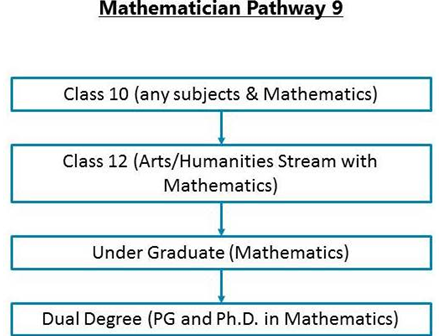
After your secondary level of schooling in any subjects and Mathematics, you can study arts/humanities stream with Mathematics in your higher secondary school and then study for an undergraduate degree in Mathematics (Honours or specialisation in Mathematics is an advantage) followed by a dual degree (M.A. and Ph.D.) degree in Mathematics.
Required Qualification & Competencies
After your Class 11-12 Physics, Chemistry, and Mathematics along with any other subject as per scheme of studies, you can do a Bachelor degree in any of the following fields:
Mathematics
Statistics
Post your Bachelor degree, you can do a Master’s degree with a specialisation in any of the following fields:
1. Actuarial Science
2. Applied Mathematics
3. Computational Mathematics
4. Cryptology
5. Financial Mathematics
6. Mathematical Biology
7. Mathematics
8. Operations Research
9. Mathematical Statistics
10. Statistics
Compentencies Required
Interests
1. Investigative: You should have interests for Investigative Occupations. Investigative occupations involve working with ideas and quite a lot of thinking, often abstract or conceptual thinking. These involve learning about facts and figures; involve use of data analysis, assessment of situations, decision making and problem solving.
2. Conventional: You should have interests for Conventional Occupations. Conventional occupations involve repetitive and routine tasks as well as fixed processes or procedures for getting things done. These occupations involve working more with data, systems, and procedures and less with ideas or creativity.
3. Artistic: You should have interests for Artistic Occupations. Artistic occupations mostly involve working with creative ideas, art and designs. These occupations involve abstract or conceptual thinking, creative self-expression and often do not follow any set processes or rules for getting things done.
Abilities
1. Abstract Reasoning: The ability to understand ideas which are not expressed in words or numbers; the ability to understand concepts which are not clearly expressed verbally or otherwise.
2. Category Flexibility: The ability to generate or use different sets of rules for combining or grouping things in different ways.
3. Deductive Reasoning: The ability to apply general rules and common logic to specific problems to produce answers that are logical and make sense. For example, understanding the reasons behind an event or a situation using general rules and common logic.
4. Flexibility of Closure: The ability to identify or detect a pattern (a figure, object, word, or sound) that is hidden among other distracting materials.
5. Inductive Reasoning: The ability to combine pieces of information from various sources, concepts, and theories to form general rules or conclusions. For example, analysing various events or situations to come out with a set of rules or conclusions.
6. Information Ordering: The ability to arrange things or actions in a certain order or pattern according to a specific rule or set of rules (e.g., patterns of numbers, letters, words, pictures, mathematical operations).
7. Mathematical Reasoning: The ability to choose the right mathematical methods or formulas to solve a problem.
8. Mental Stamina: The ability to sustain prolonged mental effort.
9. Numerical Reasoning: The ability to add, subtract, multiply, divide, and perform other basic numerical calculations correctly.
10. Speed of Closure: The ability to quickly make sense of, combine, and organize information into meaningful patterns.
11. Verbal Reasoning: The ability to think and reason with words; the ability to reason out ideas expressed in words.
Knowledge
Mathematics: Knowledge of arithmetic, algebra, geometry, calculus, trigonometry, statistics, and other mathematical disciplines and their applications.
Skills
1. Critical Thinking: Skills in analysis of complex situations, using of logic and reasoning to understand the situations and take appropriate actions or make interpretations and inferences.
2. Judgment and Decision Making: Skills in considering pros and cons of various decision alternatives; considering costs and benefits; taking appropriate and suitable decisions.
3. Problem Solving: Skills in analysis and understanding of problems, evaluating various options to solve the problems and using the best option to solve the problems.
4. Reading Comprehension: Skills in understanding written sentences and paragraphs in work related documents.
5. Scientific: Skills in using various scientific rules and methods to get things done or solve problems.
Personality
1. You are always imaginative or in most situations.
2. You always prefer to experience new things and have new experiences or you mostly do.
3. You can always act independently or could do so in most situations.
4. You are somewhat organised in your day-to-day life and activities.
5. You are somewhat careful about your actions and behaviour.
6. You are somewhat disciplined in your action and behaviour.
7. You remain calm in difficult situations sometimes but some other times you are anxious.
8. You are self-satisfied sometimes but some other times you don't feel satisfied with your life and situations.
9. You are mostly impulsive in your action and behaviour.
Career - Job Opportunities & Profiles
1. As a mathematician, there are three major career opportunities for you, i.e. academic institutions, research institutions, and private industries
2. Most of the universities and college will hire you as a physics professor at the position of Junior Professor or Assistant Professor. If you are into research, then you will be hired at the position of research associate.
3. Research institutions will hire you as a scientist/scientist officer with the lowest grade.
4. Private Industries will hire you are a controller, Research Scientist, Technical Consultant, etc.
5. As a risk analyst in financial institutions.
You can find job opportunities at the following facilities:
1. Government defence department like DRDO in India.
2. Space departments like ISRO
3. Nuclear stations and atomic research stations like BARC in India.
4. Institutes of scientific learning like IISc, IIA, RRI, TIFR, etc.
5. Mathematics department of all IITs and Engineering colleges.
6. University and Colleges with courses in Mathematics.
7. Research centres and laboratories like The Institute of Mathematical Sciences.
8. Financial institutions.
Work Environment
As a mathematician, you will be mostly working in your office, research place. Most of your research will not require you to visit field places. However, your research and work will be heavy calculation intensive. You will be required to work for several hours on solving quantitative problems. Many times, you might be working overtime to solve problems.
Specialisation Tracks In This Career
Mathematician (Actuarial Science)
Mathematician (Actuarial science) is a specialist who uses and applies mathematical and statistician methods in the field of insurance and finance related fields to access risks. As an actuary, you will apply theories and practical usage of mathematics, statistics, finance, economics and computer science.
Applied Mathematician
An applied mathematician is a specialist who applies mathematical methods in the fields of science, engineering, business, computer science, industry, economics, etc. An applied mathematician uses mathematical tools to solve practical problems by formulating mathematical tools.
Computational Mathematician
Computational Mathematician is the specialist who uses a computer in solving mathematical problems. As a computational mathematician, you will use the computer for computations that cannot be done manually. The present technology may provide an answer to several complex theories of mathematics with the help of computers.
Cryptologist
Cryptologist is a specialist who creates secure communication in cryptic codes to hide from third parties. Thus, as a cryptologist, you will create codes that third parties or the public cannot read. These codes will be carrying secret messages while ensuring data confidentiality, data integrity, authentication, and non-repudiation. Cryptologist uses knowledge of mathematics, computer science, electrical engineering, communication science, and physics. An example of the crypto code is a secret message that army communicates that the enemy army cannot understand.
Financial Mathematician
A financial mathematician is a finance and mathematics specialise who sues applied mathematics and mathematical modelling in finance markets. They use mathematics to solve several financial problems. However, a financial mathematician does not establish any financial theories, they merely solve the problems. E.g. they will not establish why a share price has fallen in the current trend, but they will only find how much share prices have fallen and may fall in the near future.
Statistician
A statistician is a specialist who uses theoretical and applied statistics. As a statistician, you will use statistics and mathematics tools to solve several complex quantitative and statistical problems.
Career Growth
1. The career growth in university and college states from Assistant Professor and then Associate Professor, Professor and Professor Emeritus. Professors can also get administrative positions such as Director/Dean/Vice Chancellor, etc
2. If you are hired as a research associate, then you will go on to become a Doctoral Research Fellow, then Post-Doctoral Research Fellow and then Scientist in Progressive Grades.
3. Research institutions will hire you as a scientist/scientist officer with the lowest grade and the grade changes from low to high. In India, grades are “Scientist “C” as the joining level and then D, E, F, G, H, etc. A senior-level scientist can also get into administrative positions like Principal Scientist, Assistant Director, Deputy Director, Director, etc
4. If you join a private organisation as a research scientist, then you will move to senior research scientist and principal scientist with work experience.
Salary Offered
1. At the entry level, you can join as a research associate with a basic salary of Rs. 25,000 to 35,000. As a doctoral research fellow (junior research fellow) you would be earning around Rs. 35,000 to 38,000 per month. At the entry level, as a Scientist (grade C) you would be earning around Rs. 80,000 to 100,000 per month. As an assistant professor, you would be earning anything between Rs. 65,000 to 70,000 per month. As a project assistant, you would be earning anything between Rs. 30,000 to 50,000. As a risk analyst, you will be earning anything between Rs. 25,000 to 2, 00,000 per month.
2. At the junior level with a work experience of 2-6 years, you would be earning anything between Rs. 70,000 to 1, 40,000 per month.
3. At the middle level with an experience of 10-12 years, you would be earning anything between Rs. 1, 40,000 to 1, 90,000 per month as a scientist and Rs. 1,20,000 to 1,60,000 as a professor. As a risk analyst, you will be earning anything between Rs. 50,000 to 5, 00,000 per month.
4. At the senior level of over 15 years of work experience, you would be earning anything between Rs. 1,60,000 to 2,00,000 per month as a professor and Rs. 2,10,000 to 2,50,000 per month as a Scientist. As a risk analyst, you will be earning anything between Rs. 1,00,000 to 10,00,000 per month.
Monthly Earnings In Indian Rupee
1. Entry level: 0 - 2 years of work experience
2. Junior Level: From 1 to 12 years of work experience
3. Mid Level: From 5 to 20+ years of work experience
4. Senior Level: From 10 to 25+ years of work experience (there could be exceptions in some high-end technical, financial, engineering, creative, management, sports, and other careers; also in the near future, people will reach these levels much faster in many careers and in some careers, these levels will have no meaning as those careers will be completely tech skill driven such as even now, there is almost no level in a Cyber Security Expert’s job)
Work Activities
1. Analysing and interpreting data and information: Analysis of data and information to find facts, trends, reasons behind situations, etc.; interpretation of data to aid in decision making.
2. Calculating and computing: Calculating or computing using various mathematical formula and functions using computers or otherwise; doing financial or commercial calculations or computations.
3. Decision making and problem solving: Analysis of data and information; evaluation of alternative decisions and results of decisions; taking the right decisions and solving problems.
4. Getting Information and learning: Observing, hearing, reading, using computers, or otherwise obtaining information and learning from it.
5. Updating and using relevant knowledge: Keeping updated with the latest knowledge relevant to your fields of work and use of the relevant knowledge in getting things done.
6. Using computers for work: Using computers for day-to-day office work; using computer software for various applications in day-to-day professional work; entering data and process information; for writing.
7. Working directly with people: Working directly with people to offer them products and services, providing assistance, etc.
Future Prospects
Mathematician has various career prospects. While they can find career opportunities in the banking and financial sector; these sectors have been growing in recent years at a rapid pace. The total asset under management stood around Rs. 23.16 trillion, giving an idea of the progressive and booming financial industry of India. Even the banking sector has grown over 11% per annum. The credit market stood at USD 281 billion.
The core mathematician research fields have career opportunities in different institutes and research centres. Most of these are managed by the government of India and they offer moderate growth prospect in future. They are funded by the government and have not seen a tremendous rise in job prospects.
Future Prospects At a Glance


